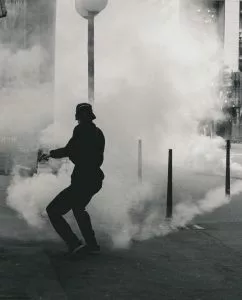
The images are everywhere on the news; protesters, exercising their Constitutionally protected right to free speech, fleeing from clouds of tear gas thrown by the police. What we have seen protesters enduring in recent months has been downright inhumane. Setting aside the fact that protesters are being abused by law enforcement for no justifiable reason, the “riot control agents”–often referred to as tear gas–that the police are using on protesters, have been banned from international warfare by the Geneva Protocol since 1925. So why on earth do we still allow tear gas to be used on citizens by the very people who are meant to protect them?
Our government’s casual use of tear gas against peaceful protesters suggests that these chemicals are not being used to control “riots”—they are often used when there clearly is no riot—but instead to punish and discourage Constitutionally protected dissent.
What is a Riot Control Agent?
A riot control agent is a chemical compound that is designed to temporarily irritate the eyes, mouth, throat, lungs, and skin of a person. There are many different kinds of tear gas, some of which are more commonly used than others. The two most common compounds that are used as tear gas are chloroacetophenone (CN) and chlorobenzylidenemalononitrile (CS). Because CN Gas is far more toxic, CS gas is more often used as tear gas. However, CN gas is still used in small, aerosol containers as ‘mace’.
What Are the Dangers of Tear Gas?
Tear gas can be extremely dangerous, especially during the current COVID-19 pandemic. Tear gas is designed to cause irritation of the eyes, mouth, throat, lungs, and skin. The result is often violent coughing which could spread COVID-19 if teargas is used in a crowd. Even if you set aside the pandemic issues, there are other health concerns surrounding tear gas. A large enough dose of tear gas can lead to blindness, respiratory failure, or death; and one study shows that those who have been exposed to tear gas are more likely to develop respiratory illnesses. However, the main concern with relation to our health is that there is not much information on the long-standing health implications of tear gas use. In fact, there have been very few epidemiological studies on the long-term effects of tear gas on the human body.
Recently, women have been experiencing changes to their menstrual cycle after being exposed to tear gas, suggesting that tear gas may damage reproductive health. The changes women are experiencing to their menstrual cycle include early, late, or missed periods and heavier than normal cramping. Planned Parenthood is currently conducting a study on this potential link. Beyond this, there isn’t much information on the long-term effects of tear gas. We do know that when tear gas is used in an enclosed space, the repercussions are often much worse than if it is used outside. Regardless of this, tear gas is still being used inside of prisons as a form of riot control. All of this brings us to the question of why on earth tear gas is allowed in this country, especially since tear gas is made up of various chemicals whose long-term health effects are unknown.
Why Isn’t Tear Gas Illegal in the United States?
Unfortunately, there isn’t a good reason why tear gas is not banned domestically. Logically, it would make sense for something that is banned in international warfare to be illegal for law enforcement to use against its own citizens, but the laws are simply not in place. In June of 2020, 1,218 public health professionals signed an open letter calling for law enforcement to end the use of tear gas, along with other respiratory irritants, against protesters. There are many other petitions and organizations currently working to end the use of tear gas, and many cities have, at least temporarily, banned the use of tear gas on citizens. However, we need long term change in this country to end the use of tear gas by law enforcement so no more innocent people are subjected to this potentially dangerous chemical.
What Should I Do If I’m Exposed to Tear Gas?
If you are exposed to tear gas, it’s important that you act as soon as possible to mitigate its effects. Below is a step-by-step plan, as recommended by many health professionals.
Tear gas is an untested, toxic chemical that is being weaponized against Americans exercising their 1st Amendment rights. It should be banned in this country, especially when it is in the hands of law enforcement that cannot be trusted to protect its citizens, and in fact, often treats its citizens as the enemy. Until that day comes, try to keep yourself safe and follow the steps above to mitigate any harm if you are exposed to tear gas.

"*" indicates required fields